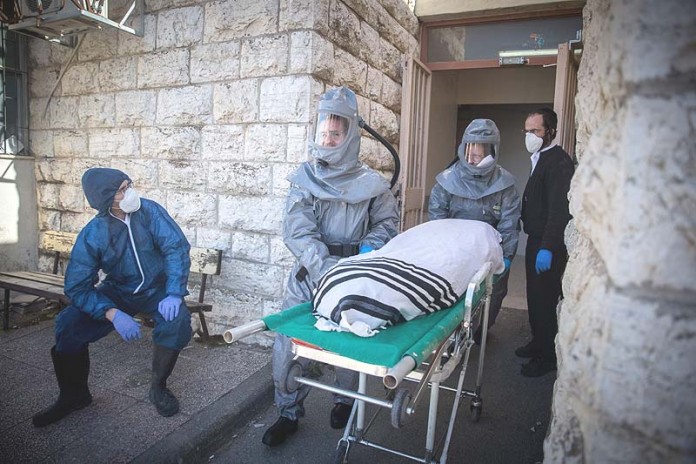With the Orthodox Jewish death toll from the coronavirus as tragically high as it is, transporting the dead to Israel for burial has become a major undertaking – and a major financial burden.
An employee at Israel’s Ben Gurion International recently confided to Calcalist, the Israeli daily newspaper and web site, that “A new industry is developing here for body-shipping and burials in Israel, most of which are coronavirus victims.”
The Health Ministry’s guidelines “are very clear on how a body must be shipped: in a casket and with consular clearance,” the source added, according to The Jewish Press. “But some of these bodies come on private jets at crazy prices, which involves executive jet companies, mainly from abroad, as well as shipping companies and all kinds of Haredi machers in the US and France – especially in places where there are financially strong Jewish communities that have been affected by the coronavirus.”
Attention to health and public safety is naturally at its highest level. For instance, according to a protocol established by the Israeli Health Ministry, corpses must be identified, then wrapped in a pair of polyethylene bags and placed inside “a sealed container with metallic walls or two wooden caskets, one inside the other.”
An employee at Ben Gurion Airport’s customs desk also told Calcalist: “If in routine times we would release one body every two to three nights, suddenly, dozens of bodies arrive from abroad in one day, mostly from New York, Paris, London. It’s really become a crazy industry.”
Understandably, those involved in the process in Israel find themselves having to deal with a flurry of emotions. “Feelings are very much mixed,” Yakov Kurtz, who works for Chevra Kadisha, the main group overseeing Jewish burials in Israel, told Reuters. “We don’t know what to expect, we don’t know how many dead we will have to tend to. There are many fears.”
Funerals and mourning rituals, noted the news service, “have changed for everyone since Israeli and Palestinian authorities imposed stay-at-home directives and restricted the size of public gatherings to try to halt the spread of infection. Funerals in Israel can be attended by no more than 20 people in an open space only. Social distancing rules mean that embracing the bereaved is just not done. That has affected the Jewish tradition of Shiva – a seven-day period that begins after a funeral, in which people come to the family home to offer condolences, bring food and reminisce about the departed.”
According to the web site
onemileatatime.com, private jet charter companies like Talon Air are seeing bookings from New York to Tel Aviv rising. “It would appear that these charter flights are transporting the deceased to Israel. Many Jews consider it an honor to be buried in Israel. Generally remains would be shipped on United Airlines, as they continue to fly from Newark to Tel Aviv.”
It’s not an inexpensive flight. “Based on doing some Googling, a Gulfstream charter usually costs over $8,000 per hour,” the web site noted. “The plane is flying roundtrip to Israel, so it’s flying for well over 20 hours. Based on that, I would guess that one of these charters must cost somewhere around $150,000 to $200,000.”






